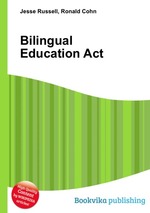Bilingual Education Act
Jesse Russell Ronald Cohn
бумажная книга
High Quality Content by WIKIPEDIA articles! The Bilingual Education Act, Title VII of the Elementary and Secondary Education Act of 1968 (or BEA) was the first piece of United States federal legislation that recognized the needs of Limited English Speaking Ability (LESA) students. The BEA was introduced in 1967 by Texas senator Ralph Yarborough and was later signed by President Lyndon B. Johnson on January 2, 1968. As such, it was the first federal legislation signed into law in the 1968 calendar year. The bill was passed as Title VII, an amendment to the Elementary and Secondary Education Act (ESEA). While many states such as California and Texas already had local and state policies to help language minority students, the BEA established the first federal policy aiding LESA students. Passed on the heels of the Civil Rights movement, its purpose was to provide school districts with federal funds, in the form of competitive grants, to establish innovative educational programs for students with limited English speaking ability. While the BEA addressed all linguistic minorities in the country, the passage of the act was spearheaded by Spanish speakers.


